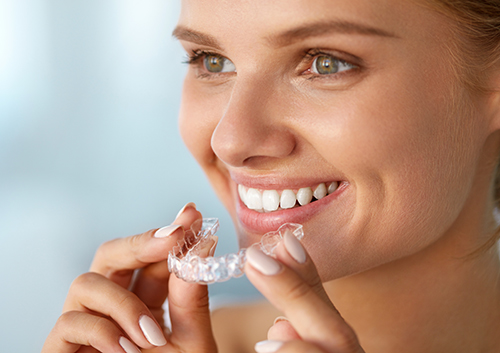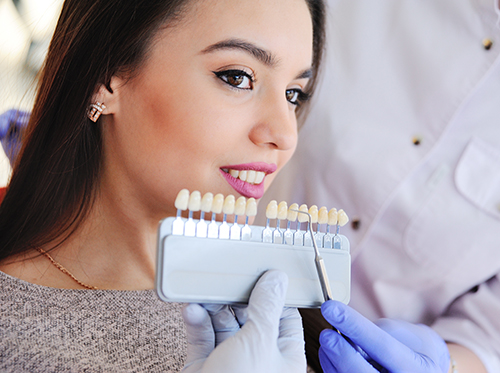September 18th, 2019

We all know that brushing your teeth and flossing regularly keeps your smile sparkly and bright, but did you realize that cleaning your teeth can actually help your heart? Recent research suggests that people with periodontal disease also have a higher cardiovascular risk, which means they are more vulnerable to heart attacks or stroke. It’s probably not time to throw away those running shoes in favor of a new toothbrush, but this is an added incentive to maintain good oral hygiene.
Relationship between Periodontal Disease and Cardiovascular Health
In 2003, researchers from the University of Buffalo conducted analyses which suggested that patients with gum disease were also at elevated risk of cardiovascular problems. Furthermore, people with more severe cases of gum disease have even poorer heart health. Although the exact causes of this relationship remain unknown, scientists continue to explore the impact of oral hygiene on broader health.
One hypothesis is that poor oral hygiene leads to inflammation, which negatively affects the heart. Gum disease occurs when bacteria build up in the mouth, and feed off sugars found in food. These bacteria release compounds that contribute to inflammation and red, swollen gums. The same inflammatory compounds may affect the heart, increasing overall cardiovascular risk.
Protect Your Teeth, Protect Your Heart
Taking a few commonsense measures can go a long way to improving your oral health and your cardiovascular risk. Consider the following:
- Brush twice daily, and floss at least once per day. Brushing your teeth at least twice a day cleans away the harmful bacteria that contribute to gum disease. Similarly, flossing your teeth ensures that dangerous bacteria that build up between each tooth get swept away. These simple steps are the easiest ways to reduce your risk of periodontal disease.
- Eat healthy foods. Those sugary snacks that you love so much don’t help your teeth. Whenever possible, stick to a healthy diet of fruits, vegetables, and whole-grain foods. For example, grab an apple or a few celery sticks for a mid-afternoon snack, rather than indulging in that candy bar.
- Drink water. Staying hydrated doesn’t just help your body – it also swishes bad bacteria away from your tooth and gum surface. Drinking plenty of water improves your overall oral health. It’s particularly helpful after eating a sugary or sticky snack, because water can reduce plaque buildup.
- Visit Henagan Team Dentistry. Dr. Henagan and our staff will monitor your mouth for signs of periodontal disease and can make specific recommendations to keep your mouth – and your heart – safer.
September 11th, 2019

You may have a talent for home repairs. You may be able to rebuild your computer. You may even be able to put together a whole room of furniture armed only with flat-box kits and an Allen wrench. But, please—don’t try do-it-yourself orthodontics!
Now that generic clear aligners are available, you might consider giving them a try to save some money. But is straightening your own teeth really a good idea? Before you are tempted, let’s look more closely at the products and the dental science involved.
Invisalign®
- Invisalign clear aligners are used by orthodontists and dentists with experience in custom treatment for your smile. A 3D image of your teeth will be captured by the iTero Element® scanner. Using special software, your doctor can map out each projected shift in your teeth, and even show you a projection of your finished smile!
- Your Invisalign aligners will be tailored to fit your teeth precisely using the 3D scan and 3D printing. They are made from SmartTrack® material, a product specifically engineered for a perfect, comfortable fit. Invisalign aligners are even trimmed to fit your individual gumline to prevent irritation.
- When your first sets of Invisalign aligners arrive at our New Iberia, LA office, Dr. Henagan will check for fit, answer any questions you might have about use and care, and let you know what to look for and what to expect. Your progress will be monitored with visits every six to eight weeks. (And for parents of teens, Invisalign aligners can offer blue “compliance indicators” to let you know they are being worn the 20-22 hours a day necessary for the best and fastest results.)
Generic Aligners
- You might be required to make a putty mold of your own upper and lower teeth, which is not the easiest thing to do well, and to take selfies of your teeth.
- The aligners will be sent to you in the mail. They are generally made of hard plastic with generic gumlines. There will be no one to tell you if the aligners fit properly.
- They are sometimes less expensive because there is no in-person medical supervision. A dental professional working for the company will look at the model created from molds you submit, and recommend a series of aligners to correct the problems he detects by looking at the model and your selfies. This supervisor will not be able to assess the overall dental health of each patient to make sure teeth and gums are healthy and ready to start treatment, and will not be able to tell if the teeth are moving properly or improperly once the aligners are in use.
Finally, while generic aligners may potentially have some success in minor tooth straightening, they are not created to deal with complex bite issues or malocclusions. In fact, using generic aligners with no supervision can cause more serious dental problems than a patient started with.
Sure, sometimes a do-it-yourself project turns out well. But your teeth and bones are too important for home improvement. When it comes to creating a beautiful, even smile and balanced, comfortable bite while making sure of your dental health, it’s always best to trust a professional like Dr. Henagan to provide you with gentle, tested, and successful care!
September 4th, 2019

Like many other parts of the human body, teeth age. You may look at old photos and realize your smile was significantly brighter in the past than it is now. Many adults experience tooth discoloration and find it embarrassing.
The good news is there are treatment options! The first step to recovering your bright smile and finding appropriate treatment is to determine what’s causing the discoloration.
There are multiple reasons for tooth discoloration. Some are under your control, but unfortunately, others may not be. Glance at the list below and see if you can pinpoint the cause of your tooth discoloration.
- Poor Dental Hygiene: This one is obvious. There’s a reason your parents (and dentist) always told you to brush and floss three times a day.
- Genetics: A big part of your dental health is determined by genetics; in other words, what runs in your family. Sometimes people inherit naturally discolored teeth.
- Diet: Do you eat sugary foods often? Drink lots of soda? Gulp more than two cups of coffee a day? Are you an energy drink fan? We’re not pointing any fingers ... but you should do the math.
- Tobacco: Because cigarettes contain nicotine, they can readily stain your teeth. So hardcore smokers often develop prominent brown stains.
- Medications: Medicines such as doxycycline, tetracycline, antihistamines, blood-pressure medications, and antipsychotic drugs can all create tooth discoloration as a side effect. (If you suspect this could be the case for you, don’t ever discontinue your medication without consulting your doctor first!)
Did you find the culprit? Perhaps the easiest way to avoid tooth discoloration in your case might be to make some simple adjustments to your diet and other habits.
Also, when you consume drinks or foods that are high in acid or sugar content, take a moment to rinse your mouth with water afterward. If you’re an avid tobacco user, you may want to reconsider that; especially because it can have deadly effects that go way beyond your smile.
Dr. Henagan can also suggest other treatment options. While over-the-counter agents do help, in-office whitening treatments tend to be more effective. If whitening agents don’t alleviate the problem, you may want to consider bondings or veneers.
If you’re worried about discoloration of your teeth, or have any questions about how to treat it, please feel free to reach out to our New Iberia, LA office! We can help you identify what may be causing the problem and work with you to give you a smile you’ll be proud of.
August 28th, 2019

What do we know about osteoporosis? We may know that this disease makes the bones more brittle and vulnerable. We may know that osteoporosis is the cause of many a broken hip or curved spine as we age. We may even know that, for a number of reasons, women are far more likely to develop this disease. What we may not be aware of is the impact osteoporosis can have on our dental health.
“Osteoporosis” means “porous bones.” It is a disease that makes the bones more likely to fracture or break, as the body’s careful balance of absorbing old bone tissue and replacing it with new healthy bone tissue is disrupted. We lose bone tissue faster than we can create new, dense bone tissue. Why is this important for our dental health? Because the fitness of our teeth depends on the fitness of the bones surrounding and securing them in our jaws.
How does osteoporosis affect dental health?
- Osteoporosis reduces density in the bones and bone tissue that hold our teeth in place. Studies have shown that women with osteoporosis have significantly more tooth loss than women without the disease.
- Periodontitis, or gum disease, can also cause deterioration in the bone surrounding the teeth. This is a time to be proactive with gum health to avoid infections and further bone loss.
- Denture wearers may find that their dentures no longer fit properly due to changes in bone structure. Bone loss needs to be addressed promptly to avoid having to replace dentures.
- Rarely, bone-strengthening medications for osteoporosis can lead to serious jaw problems after dental procedures that involve the jawbone (such as extractions). Always tell us any medications you are taking before we schedule any dental treatment.
Unfortunately, osteoporosis often has no symptoms at all—until the first bone fracture. Checking our bone density is important as we age, and one way of discovering changes in bone density is through your regular dental checkups at our New Iberia, LA office. We can pinpoint changes in your X-rays through the years and will recommend that you see your physician if there is any indication of bone loss. If you have already been diagnosed with the disease, we have ideas to help maintain the health of your teeth and bones.
Many factors can increase your chance of developing osteoporosis. Age, illness, personal habits, medications, diet, genetics—any number of conditions can affect our bone health. Talk to us about osteoporosis. Dr. Henagan would like to work with you to provide prevention and treatment to keep your teeth and bones strong and healthy for a lifetime of beautiful smiles. And that’s certainly good to know!





